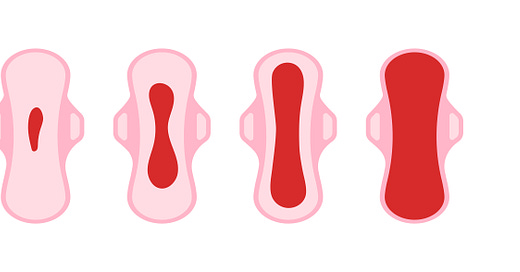I’ve seen a lot of discussion recently about heavy periods and the menopause transition, a.k.a perimenopause, on social media, so I thought it was time for a review. Here I am hoping to provide you with the information that will help you communicate with your health care professional and to advocate for the right testing and therapies.
We don’t talk enough about heavy periods in the menopause transition. In fact, many women have no idea that this is a common thing until they are flooding the bathroom floor. And even when they are prepared, sometimes the bleeding just seems to come out of nowhere. Once, I was in the room with a patient and the menstrual floodgates opened up all over the stool I was sitting on. In addition, many women don’t get a diagnosis or adequate treatment; one study suggests only 20% of women with heavy bleeding get an appropriate diagnosis and treatment. I don’t really know what to say about that dismal number, except that is why I write articles like this.
Considering the absolute hassle of heavy periods and the fact that anemia and iron deficiency are common consequences of heavy periods, an appropriate diagnosis and treatment is crucial. Many of the symptoms of iron deficiency, such as brain fog, depression, fatigue, and hair loss, overlap with symptoms of perimenopause/menopause, so an accurate diagnosis is important. It’s also critical to take heavy bleeding seriously, because for some women it can be a sign of cancer.
The Scope of the Problem
The Study of Women’s Health Across the Nation (SWAN) looked at bleeding patterns during the menopause transition. It’s probably no surprise to anyone who has been through the menopause transition that 91.0% of women reported at least one period that was 10 days or longer and 77.7% reported three or more of these super long periods (for 27.5% of this latter group, all three super long periods happened within a 6-month span, which is…a lot of bleeding). Just over one-third of women (34.5%) had three or more periods where they bled heavily for three or more days. Both prolonged periods and heavy periods were more common in the late menopause transition (within 3 years of the final period) when compared with the early menopause transition.
Hence, why it’s important to be prepared.
(This made me think about the song “Be Prepared” from the Lion King, which given it is about an upcoming carnage, feels appropriate for the subject of very heavy periods).
What is a Heavy Period Anyway?
Heavy bleeding is a flow that is too heavy (think a super soaker) or one that lasts longer than typical-or both. Medically, we consider any of of the following to be heavy:
Bleeding for longer than seven days
Clots bigger than the size of a quarter
Soak through menstrual products onto clothes or sheets
A sensation of gushing with standing
Needing to double up on menstrual products
I think it’s good to learn these definitions, because if you are in a situation where you feel you are not being heard, you can say something like (assuming this applies to you): “I have clots that are bigger than a quarter and I bleed for 8 days, so I know that my periods meet the medical criteria for being abnormally heavy.”
Even if your periods don’t meet the above definitions, believing that your periods are heavier than they should be actually counts as heavy bleeding. I think of this as the René Descartes definition, "I think my bleeding is heavy, therefore I am bleeding heavily" (he is famous for having actually said, “I think, therefore I am”).
Here we’re going to focus on heavy bleeding in the menopause transition. While this article may be helpful if you bleeding has always been heavy or started to get heavy in your 20s or 30s, it won’t be comprehensive for you.
Heavy Bleeding: Is it Age or Perimenopause or Both?
There are two things going on at once: aging and the menopause transition, a.k.a perimenopause. Aging can lead to physical changes in the uterus, but also with aging
Keep reading with a 7-day free trial
Subscribe to The Vajenda to keep reading this post and get 7 days of free access to the full post archives.





